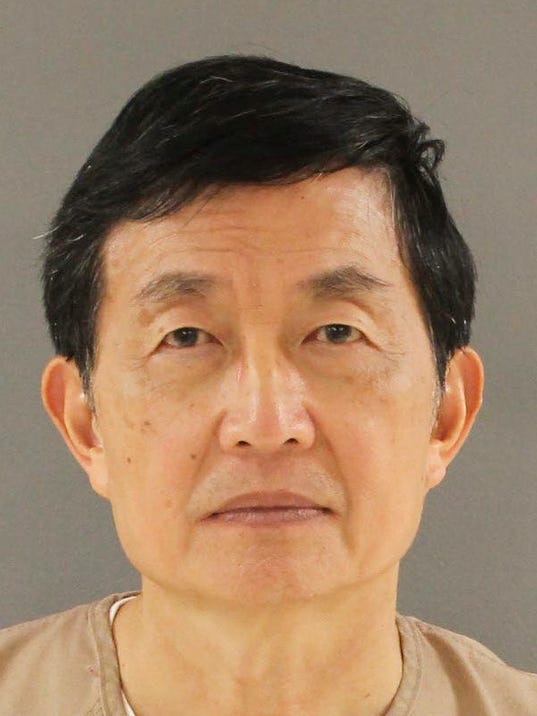- Plea set for Chinese spy Szuhsiung "Allen" Ho
- Szuhsiung "Allen" Ho's cooperation seen as key to national security

The Quiet Chinese
In the nation's first legal challenge of Chinese procurement of American nuclear know-how, the government has scored a victory in procuring the cooperation of an operative for China, federal court records show.
According to a docket entry, Szuhsiung "Allen" Ho is scheduled to plead guilty Friday in U.S. District Court in the nation's first case of nuclear espionage involving China.
The plea deal itself has not yet been filed.
But a stack of documents already filed in the case suggest Ho's plea is considered key to gathering intelligence on the inner workings of China's nuclear program -- both the one used to power homes and the one to make war -- in a case in which the Chinese government refuses to even acknowledge the indictment of its own nuclear power company.
Ho is charged in U.S. District Court in Knoxville with plotting to develop special nuclear material illegally outside the United States.
Ho, his firm Energy Technology International, and Chinese nuclear power plant China General Nuclear Power were indicted in April in a plot to lure nuclear experts in the U.S. into providing information to allow China to develop and produce nuclear material based on American technology and below the radar of the U.S. government.
It is the first such case in the nation brought under a provision of law that regulates the sharing of U.S. nuclear technology with certain countries deemed too untrustworthy to see it.
But a stack of documents already filed in the case suggest Ho's plea is considered key to gathering intelligence on the inner workings of China's nuclear program -- both the one used to power homes and the one to make war -- in a case in which the Chinese government refuses to even acknowledge the indictment of its own nuclear power company.
Ho is charged in U.S. District Court in Knoxville with plotting to develop special nuclear material illegally outside the United States.
Ho, his firm Energy Technology International, and Chinese nuclear power plant China General Nuclear Power were indicted in April in a plot to lure nuclear experts in the U.S. into providing information to allow China to develop and produce nuclear material based on American technology and below the radar of the U.S. government.
It is the first such case in the nation brought under a provision of law that regulates the sharing of U.S. nuclear technology with certain countries deemed too untrustworthy to see it.
Those countries include China.
Although the technology is used for nuclear-power generation, the by-product of that process can be used to produce nuclear weapons.
The investigation began at the behest of the Tennessee Valley Authority, which contacted the FBI with concerns about one of its senior executives, engineer Ching Huey, who later admitted he was paid by Ho and, by extension, the Chinese government, to supply information about nuclear power production and even traveled to China on the Chinese government's dime.
The investigation began at the behest of the Tennessee Valley Authority, which contacted the FBI with concerns about one of its senior executives, engineer Ching Huey, who later admitted he was paid by Ho and, by extension, the Chinese government, to supply information about nuclear power production and even traveled to China on the Chinese government's dime.
Huey agreed to cooperate in the probe.
He has since struck a plea deal.
Ho, a Taiwan native who became a naturalized U.S. citizen, brought to the defense table a stable of high-priced attorneys, including Washington attorney Peter Zeidenberg and Knoxville attorney Wade Davies.
Ho, a Taiwan native who became a naturalized U.S. citizen, brought to the defense table a stable of high-priced attorneys, including Washington attorney Peter Zeidenberg and Knoxville attorney Wade Davies.
Assistant U.S. Attorney Charles Atchley Jr. has repeatedly insisted in court the Chinese government had paid Ho millions for his spy work.
Ho worked for the Chinese government and lived in China most of the time.
Testimony from FBI Agent William Leckrone also emphasized Ho's key position in the eyes of those tasked with national security for the U.S.
Testimony from FBI Agent William Leckrone also emphasized Ho's key position in the eyes of those tasked with national security for the U.S.
In a recent hearing, Leckrone said the FBI "believed Ho had information of value to the intelligence community."
The FBI pushed him to cooperate the day of his arrest in April, but he refused, court records show.
A lawyer with the Justice Department's National Security Division is now attached to the local prosecution team of Atchley and Assistant U.S. Attorney Bart Slabbekorn Jr.
Under a standard plea deal, a suspect is required to debrief with the government.
A lawyer with the Justice Department's National Security Division is now attached to the local prosecution team of Atchley and Assistant U.S. Attorney Bart Slabbekorn Jr.
Under a standard plea deal, a suspect is required to debrief with the government.
The extent of Ho's cooperation agreement is not yet known.
Aucun commentaire:
Enregistrer un commentaire